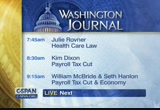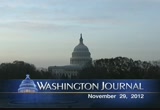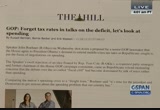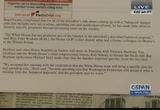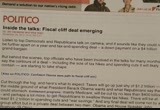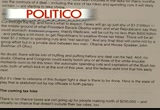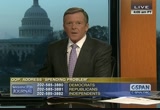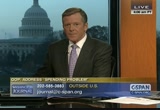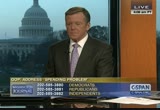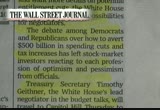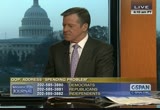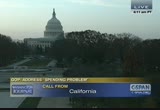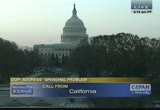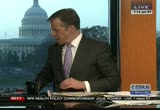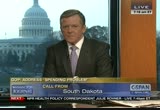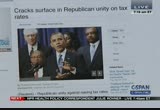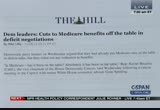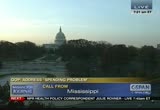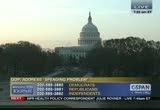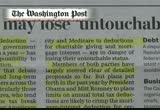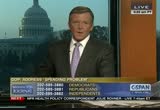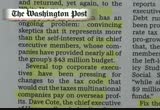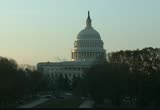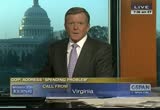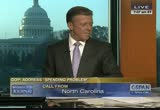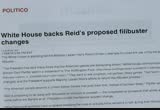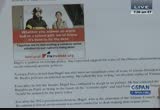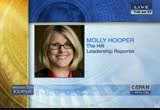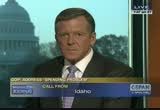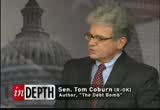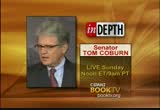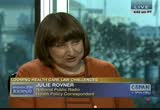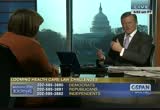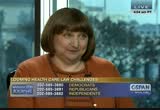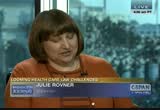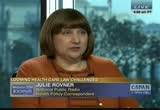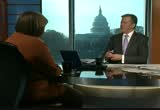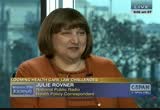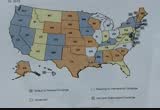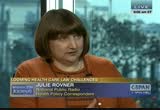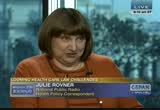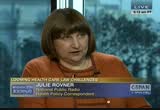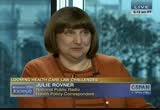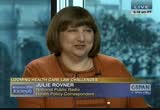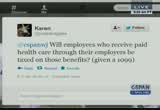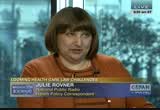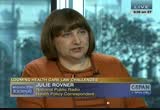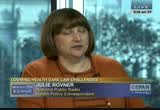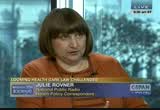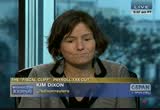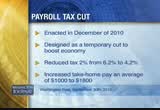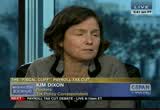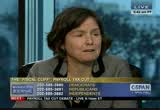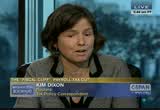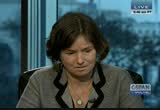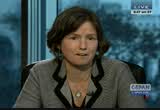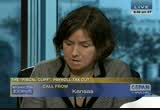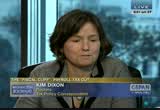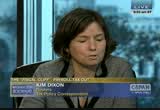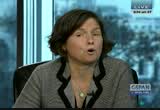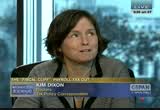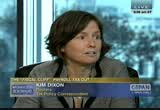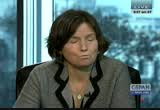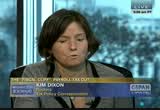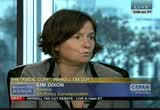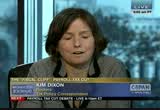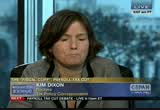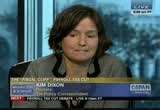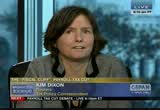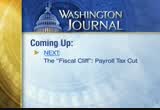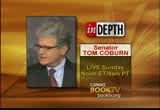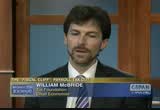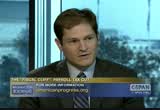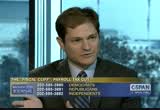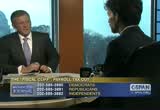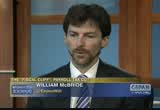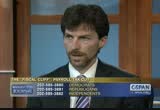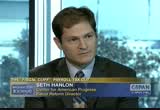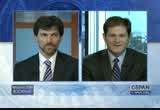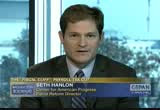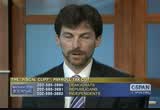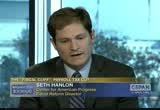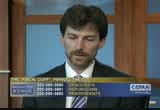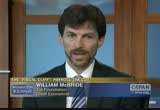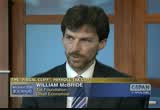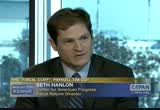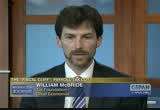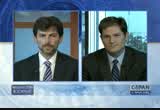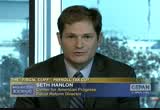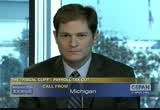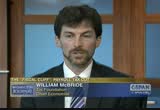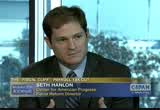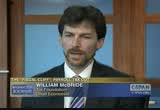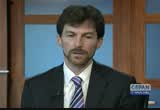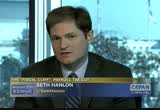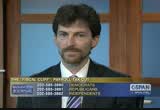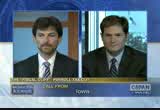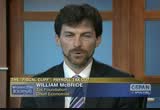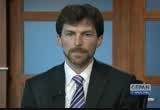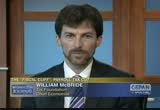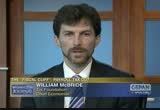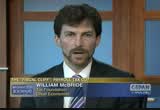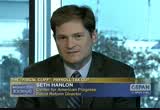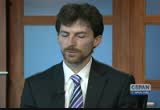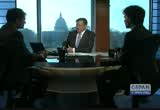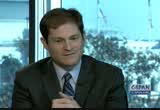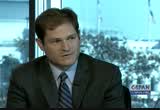tv Washington Journal CSPAN November 29, 2012 7:00am-10:00am EST
7:00 am
at 8:30, kim dixon on the payroll tax cut. william mcbride and seth hanlon on >> the president's been talking a lot about taxes lately. as a c.p.a. who practiced tax for years as a member of the wames there's no one who likes to talk about tax more than i do. but, let's be honest, talking about taxes is not going to solve the problem that america faces. we have to turn to the spending side of the ledger. and furthermore, his tax proposal will kill about 700,000 jobs and do harm to the economy, again the wrong direction.
7:01 am
host: and that was the new g.o.p. conference secretary voicing her thoughts on the fiscal cliff negotiations yesterday. and we want you to address the issue of what the g.o.p. is raising, which is address the spending problem. 202 is the area code for our numbers. that's our question this morning in this first segment of the "washington journal." you can also contact us via social media and email. you can make a comment on our facebook page, and finally send us a tweet. here is the hill newspaper from this morning. g.o.p. forget tax rates in talks
7:02 am
on the deficit, let's look at the spending. the speaker's swift rejection of an idea floated by representative tom cole of oklahoma, a respected party strategist and former chair of the house g.o.p. campaign committee came as the republicans voiced increasing concerns over the debate of the so-called fiscal cliff. boehner said it's time for them to get serious about the spending problem that our country has. republicans complain that for all the talk of coming up with a balanced budget plan, he has made little effort to identify specific proposals beyond increasing taxes on the wealthy. "the white house has not produced any of the balance in
7:03 am
the president's described balance proposal that peter roscoe, the house g.o.p.'s deputy whip. boehner and the other house republican leaders will meet on thursday with treasury sec tir tim geitner and the white house's chief congressional li aison to discuss the fiscal cliff. that's the hill newspaper. here's politico this morning, inside the talk, fiscal cliff deal emerging is what some write this morning.
7:05 am
and that's from politico this morning. first call up on our question this morning, g.o.p. says address the spending problem and in silver spring, maryland, democrat, good morning anne. caller: yes, well i would like the g.o.p. to be a little more specific because all of them who signed the pledge they want to slink government. i listen to c-span. they're so upset about ben gauzey, which they should be upset about, they don't take into account that the state
7:06 am
department has a shoestring budget. people are very upset about the compounding, but the f.d.a. operates on a shoestring budget because they have been shrinking government. host: so anne, do you see room for cut? caller: yes, i see room for budget cuts in the defense department. i'm a senior citizen facing retirement, and i really do believe in some means testing for social security. it's an insurance program. and there are people, you're just like with your health insurance, if you're really lucky and you've done the right things, and you're really healthy, you're not complaining that you've paid for health insurance. and then the people who need it, there's money for them. so it's the same thing. there are many people who have benefited greatly, sometimes from unfairnesses that rich people have bought for
7:07 am
themselves and our country. but your people have benefited, and so you know why should they be connecting social security insurance? host: bonnie is in oklahoma on our republican line. good morning, you're on the "washington journal." caller: good morning. host: please go ahead. caller: i think that they should not care anything for obama because he was such a smart alec during the election that they shouldn't give him a thing. i think they should let it go over the cliff and he wants taxes raised, then he can have it. i think that msnbc really scratched the bottom of the barrel when they gave al sharpton a program. he is the pits. he is awful. host: and randy's an independent in butler, oklahoma. randy, what do you think?
7:08 am
g.o.p. says address the spending problem. caller: well, yeah, i think that's part of it. but surely taxes need to go up. half the thing ought to be taxes going up. i don't care if they raise it on me or rich people or everybody, taxes got to go up. right now the military budget is $700 billion, the second biggest spender is china, which means we could cut it 90% and still have a bigger budget than china. that would have saved us 4,405 dead. so everybody knows that military -- my dad was in the army and he knows it, so you know -- well, we don't need to defend the whole world. that's not in our constitution
7:09 am
and nobody really wants us to do it. host: lead story in the wall street journalism, president obama's signal he wouldn't insist tax rates on upper income americans rise as part of a deficit reduction deal. so a new flexibility as he tries to accelerate talks with republic conditions. new clirity of the white house position marks a potentially important moment to figure out how to handle tax rates that are due to snap higher next year. one of the thorniest elements of the so-called fiscal cliff.
7:10 am
host: that's the lead story this morning in the "wall street journal." marisa is a democrat in montana. marisa, good morning to you. the g.o.p. says address the spending problem. what do you think? caller: oh, thank you so much for taking my call. i'm so grateful and so grateful for c-span. let's never forget the dark days of the bush administration when dan rather got fired and no one would talk about anything. this open dialogue, which does lead to solution of problems. i'm so grateful, thank you c-span. i would like to say that i can remember at the very beginning
7:11 am
of the bush administration when those democratic congressmen got up and said if we do this we're going to have these dire financial problems. sure enough we did. and then it's the bush's administration lack of leadership that has brought us into all these gigantic problems like the b.p. oil spill, due to lack of oversight. so thank you so much, we can solve our problems, there is such a thing as a possiblist, possibility, it's possible to solve this problem, we can do anything. host: all right, we leave it there -- caller: wait, wait, wait -- host: we move onto howard. caller: well, good morning. i wish you had let that lady from montana continue, but yes she did ramble on a bit. to get to the budget, i think first of all have to understand that -- and i'll speak slowly so
7:12 am
all the lib cals out there understand. when the next congress is gaveled in, two-thirds of our income is fixed and stunted. republicans are asking for a reduction in government spending. there has never been a liberal progressive a democrat that can find any issue, especially social issues that need to be cut back. it's just not in their genes. that's how we established $16 trillion in debt. of course you can include george bush and his compassion nate conservativism which gave us a true trillion dollars, and then of course we have the president whose george bush on steroids when it comes to spending. now the problem overall is
7:13 am
unless this country comes to grips with the fact that we can't afford all these social issues at the level that we're spending, this country is not going to go down the cliff, they're going to go down the drain. host: that was howard in california. danny says the reason we have a spending problem is because the rich investor class has created a low wage for free trade.
7:14 am
host: here are some tweets we've been receiving on this issue. joseph says spending cuts have to be on the table, ending bush tax cuts for those earning over $250,000 is a start. aalways cut what hurts the most people blame the other side. it seems republicans are under the assumption they won this past election. they did not, the people support the president's plan. bruce is an independent in new
7:15 am
york. bruce, good morning, you're on the "washington journal." caller: good morning. i'm a landlord and i'm a small landlord, but i rent to section 8 people and social services, and for the love of me i can't figure out is how a person has to go to work and rent because he can't afford an apartment so he rents a room, he pays maybe $100 a week. well, we have people who do not who get a one bedroom apartment for $900, ok? but here's how we save. if we took and bought a four bedroom apartment and had four people living in it on social services, it would cost us $1,400 a month compared to $3600 we're putting out now. and i'd say that we have to change our ways, because you know what? we just can't let them think
7:16 am
this is what they're supposed to get, food stamps and social security disability and all kinds of benefits, and got more benefits than we have. they get tested, if you're a working family, you get none of these benefits. but the thing is we want to make them, if they're really destitute, to have to live together, just like someone who works and can't afford an apartment. he goes in there for that one room and he pays $100 a week because that's what he can afford. but there's no reason we should have all of these people making, living in nice apartments, some of them do, some of them don't. but the thing is that we can save probably $40 billion a year on just the rentals. host: all right, that's bruce in new york. back to the "wall street journal." the white house has previously said it's $1.6 trillion deficit reduction proposal included
7:17 am
7:18 am
from tactics such as limits on tax deductions. separately, a stat grew more come plated wednesday when a democrat of louisiana joined senate finance commit te chair max bah cuss in saying she wouldn't support the white house proposal. with the tax taking effect after the first $10 million is transferred and she described the issue as make or break for me. currently the estate tax aplease only to estates worth at least 5.12 trillion. richard in sioux falls, north dakota -- caller: probably just the people like obama and buffet are fools. after 1410 days, people are still blaming george bush. come on, get a life. what's going to happen is they're going to kick this down the road like they do, eventually we'll become like europe. all these lazy people, like that gentleman who deals with section 8 housing and all that, want to sit around andly like a pig, live off government food. more and more people like that and more people at c nbc, msnbc,
7:19 am
and even c-span, which 20 years ago was a great, great organization. right now you have so many worth less programs. why don't you have programs where you're having live debate on real people, it stead of having people on what they would like to propose a plan for the future. a plan for the future is too late. they need to do something now. if you think increasing taxes is going to jumpstart the economy, good luck with that. smart people have already taken their money off the board. they're already taking their money out of circulation, putting in the cash, stuff that's not going to be touched by the federal government. they're not fools. how do you think they got rich? they're not going to put up with taking care of fat, sloth earn, lazy -- caller: richard, don't ever call in here again. that's worthless talk. we don't need that. let's block that number. republican unity on raising tax
7:20 am
rates for the wealthy begin to show cracks on wednesday after a conservative congressman would back an agreement with president barack obama to raise rates on the rich that extend tax cuts for income below $250,000. with congress scrambling to avert the series of tax inincreasing and spending cuts due to cut in, should approve a deal ensuring that $98% of americans do not suffer a tax increase that endangers the economic recovery. that's from the national journal this morning. this is from the hill newspaper.
7:21 am
that's where you lose us because we want to strengthen these programs, not let them die on the vine. again, that's from "the hill" newspaper. dixie is a republican in clinton, mississippi. what do you think? caller: good morning and thank you for taking my call. i think it is a surprise to me, and i cannot help but wonder why all the talk about increasing taxes, making cuts, and we need cuts, why the welfare is never addressed. we have people who are living like millionaires from welfare. they get free food, they get free housing, they get free
7:22 am
schooling, they get -- the children get lunches two times a day at school. and they get all kind of benefits, but nothing is ever said about cutting any of that. that medical bills are paid. people criticize medicare, but people on medicaid get much better care than the people who are on medicare. i paid over $3,000 for my hearing aid, that came out of my pocket. if i had been on medicaid, that would have been absolutely free. but nobody ever talks about cutting any of that. i think every social program should have a sunset date. and besides, when they talk about cutting, that's never a cut, it's just a decrease in the amount of increase. i really think there's no hope
7:23 am
for this country any more. i'm 82 years old, i've lived through a lot. i don't ohno one a penny, because my income is $1,700 a month. i don't spend what i don't have. host: that's dixie in clinton, mississippi. we're going to leave your comments there. speaker boehner held his news conference yesterday and here's a little bit about what he had to say yesterday. >> about raising taxes on the so-called top 2%. half of these taxpayers are small business owners that pay their taxes through their personal income tax filing every year. the goal here is to grow the economy and control spending. you're not going to grow the economy, if you raise tax rates on the top two rates. it will hurt small businesses, it will hurt our economy, it's why this is not the right approach. we're willing to put revenue on the table, as long as we're not raising rates. host: from the "washington post"
7:24 am
7:25 am
host: dale in missouri on our independent line, dale, what are your thoughts on addressing the spending problem? caller: yeah, that's exactly right do you hear me? host: we're listening. caller: it is exactly right, it's a spending problem. who was the fat cat there? homeland security or the secret service with the $800,000 party. the guy in vevass, the hot tub? host: are you talking about the g.s.a.? caller: yeah. was it a government visa card? here, just put it on my government card here, everybody's got one. to the people out there, the masses out there, you think he's the only one? you know they all do it. then he resigns his position and laughs all the way to the bank. that's got to stop.
7:26 am
they're all doing it. and it's just major corruption. host: fran, jacksonville, florida. yes, we're listening. caller: oh, thank you. i was calling, wanted to know if i heard that excerpt from the wall street journal article correctly, that the president might be relenting on his pledge to not sign anything that didn't have that increase with the upper 1%. host: well, i think it's a little more nuanced than that. it says here again, here's the headline. obama is flexible of highest tax rates. and what it says is that it's not so much that he won't sign anything, it's more of how high the tax rates would go.
7:27 am
so does that -- how do you see that? how do you reed that? caller: i would really be disappointed in that, because he's been fighting for that since the beginning. he relented a few years ago in order to save the unemployment insurance for the unemployed people and some other stipulations that were being held hostage by the g.o.p. but he doesn't have to do that any more. and right after he did that, they called that his tax breaks for the wealthy. and he absolutely didn't want to do that. but he felt compeled to to save the people who really needed help. he doesn't need to do that now. those same people that needed that help, they realized that he did that for him. if all of the tax rates go up, and i'm one of those below
7:28 am
$40,000, all of the tax rates go up, i'd be willing to sacrifice just so the black mail can't continue. host: all right fran, thank you for calling in. here's a little bit of the president from yesterday. >> it means a tougher choice between paying the rent and paying tuition, and middle class families just can't afford that right now. by the way, businesses can't afford it either. yesterday i sat down with some small business owners who stressed this point. the economists predict that if taxes go up on the middle class next year, consumers will spend nearly $200 billion less on things like cars and clothes and turn sure. and that obviously means fewer customers, that cuts into business profits, that makes businesses less likely to invest and hire, which means fewer
7:29 am
jobs. and that can drag our entire economy down. host: and dennis tweets in our system of government is good cop, bad cop, but they both still have the same boss, corporations. and here's the washington post this morning, business leaders debt push has doubters in the discussion about the fiscal cliff.
7:30 am
7:31 am
emmett fraser of merck and another person walking out. we're going to move onto william in maryland on our republican line. hi, william. caller: gorn. i love watching c-span, i'm a first time caller. host: welcome. caller: thank you. i'm not the greatest at this, but i can tell you as an african-american republican, who is a home owner association's president for his community of 339 homes, and someone who works in security, and someone who volunteers at least 40 hours a week on his community, there is a issue with us as americans and picking up slack. we put too much on the federal
7:32 am
government to do. we as people need to stand more for each other and help each other. and i guarantee you if we took the money out of the politics, and we as the people stood together with one another and helped each other as in the churches and the communities, just americans, if we helped each other we would see places go down. we would see jobs come, we would see our kids educated better because we would have an invested understanding of it's about us being better, not about who's the weakest link, not about who's poor or rich, but about just making a -- that's it. host: this is bill in camden, illinois. independent line. caller: good morning, c-span. you know, it's really disastrous the way the government is
7:33 am
handling. they want the taxes but they don't want to cut anything. and you can look at illinois and california as a prime example of what happens when you increase taxes and you don't cut spending. they should have a program where everybody under 50 on an entitlement program is trained for a certain occupation and once they're trained, if they're offered a job in that occupation and they turn it down, they lose their entight ltment, as long as it's not a real bad physical condition. the other thing is, we're creating generations of dependent people because we make it more enticing for them to stay on entitlements than to go out and find work. i mean, you can't make enough on minimum wage to equal the entitlement programs that are given to people. and that's my comment. thank you. host: from the washington times this morning, obama, romney to
7:34 am
meet for lunch at white house. the white house revealed that the men will have lunch in the private dining room of the white house. it will be their first extensive meeting ever other than their three debates during the fall campaign. they have had only a few brief encounters. while in washington, mr. romney also reportedly will visit with his former running mate paul ryan of wisconsin who is heavily golved in the g.o.p.'s negotiations with the obama administration to solve the government's fiscal cliff. since the election, mr. rom knit has secluded himself from the media at his southern california home making no public appearances but has bad photographed killing his car at a local gas station and taking a day trip with his grandchildren to nearby disneyland. linden in bristol, virginia on our democrats line. the g.o.p. says to address the spending problem, what do you think? caller: i kind of agree more
7:35 am
with the president that it should be a balanced approach. yes, we probably do have a spending problem. i agree. but i definitely believe that there is a problem with our revenue and you know, to go back for guys who make billions or millions of dollars every year and just interest alone, who -- a secretary to work every day does that 40 hour a week. so i think it's a balanced approach leaning more towards revenue as a way to solve things. definitely got to cut spending. the other thing i wanted to say is, i'm in the 3%, the 3% of americans -- and i'm also in that smallest percentage who
7:36 am
have retired from military service. i find it really shameful if you listen to, i love your show, i listen it to every morning on our way to work, on x.m., and i think it's shameful when you listen to people who complain about the fact that folks who don't have anything, you know receiving, people who lose their jobs for example, we see them receiving from the government. i don't think a hand out is the way. don't get me wrong, but i think everybody should -- if you're in that situation -- kind of like having unemployment insurance and you lose your job, so you know, if you listen to some folks they would tell you that that person shouldn't receive
7:37 am
their unemployment insurance. and you know, i think that's just shameful that we have so many people who feel that way. host: and that was linden from bristol, virginia calling in, listening to c-span radio on x.m. you can also listen to it here in the washington, baltimore area on 90.1. from political co, john boehner to g.o.p., stick together. next call, terry in north carolina. caller: good morning. host: please go ahead with your comment about spending in the fiscal cliff. kip well ok, i'm going to tell you as a native american what the government's done for our people pretty much for 150
7:38 am
years. we've been given a check, barely enough to survive. on the reservation, high poverty, drug, alcohol, suicide rates. i look at the last 50 years and what the government's done for the black man, i've never seen not one public housing complex. you can go down to hud and look at all the little by they girls sitting in their with a baby in one arm and a cell phone and a cigarette in the other -- host: so terry, what's your point? caller: what my point is is that democrats are putting this country into poverty. plain and simple. host: all right, we got your point, thank you for calling in this morning. from politico this morning --
7:39 am
7:40 am
policy has expressed support for some of the obama administrations recent national security policy. again, that's from the hill reporting on foreign policy magazine's article yesterday. now, this is from the washington times this morning. hill panels play musical chairs, this is about the new chairs of the house committees in the house of representatives, and from yesterday's newspaper, the hill, gmple o.p. women press boehner for top committee spots. this is molly hooper's article. molly hooper reports on the leadership in congress for the hill newspaper. molly, who are some of the new chairs? caller: well, the new chairs happen to mostly be men. in fact, they're all men, with the exception of two open spots that have yet to be assigned by speaker boehner. but we're basically going to see
7:41 am
a lot of the old faces. there's seven committees have new chairman this year, or will in the next congress. you'll be seeing a conservative republican from texas, atop financial services. ed royce, california republican of foreign affairs. representative mike mccall, texas republican obviously, is going to be at the top of homeland security committee. there's a big fight for the homeland security for that position. and in fact, one woman, candice miller went out for that spot, and i'm told by various sources in the room where the decisions are basically made, among a select group of republicans, that in fact there were at least three to four rounds of votes because the vote was tied. and eventually mike mccall, who speaker boehner was backing, privately, ended up taking the
7:42 am
spot. we also have former national republican committee chairman pete sessions who was successful in the last two cycles is going to be taking over david dryer's spot, which is a leadership position. and bill shuster is going to be the new head of the transportation infravuckchur committee. host: molly hooper, how concerned was the g.o.p. during all of this with the fact that -- first of all, where are the two open spots? caller: the two open spots are for the ethics committee, which is not considered the best job in washington, d.c. when you have to sit and judge your peers. and the house administration committee, which runs operations on capitol hill. the person who is the charmente of that, or the chairperson as it may be of that committee, is also known around the hill as "the mayor."
7:43 am
and those two positions are unique in that the speaker gets to designate the individual at his sole discretion, or in pelosi's case, her sole discretion. they're considered kind of psuedo leadership positions, but again because they're not necessarily policy focused, it's a slightly different kind of position. host: when you look at all these new chairs of the committees that were elected by their peers, and you can see here it's white males across the board, give the tenor of some of the comments during the 2012 election season, was there a concern? caller: oh, definitely. yes, yes there was a concern, but it was also semi allayed among the republicans with the fact that there are three republican women who are sitting at the leadership table this year, which is historic. because in the past there haven't been any. when i say, there have been
7:44 am
women at the leadership table, but not as men as there are now. i mean the elected leaders, like for example republican, the g.o.p. conference chairperson is now cathy mcmorris rogers. the vice chairwoman of the conference is lynn jen jenkins, a republican from texas, and virginia fox from north carolina. but at the same time, it's one thing to be a member of the elected leadership, to sit around the table and discuss strategy and where to take the conference. it's an entirely different thing when you are essentially the chairperson of a committee and you're in charge of moving legislation and everything that's in your -- host: so molly hooper, who's the new head of the appropriation committee? caller: well, that would be hal rogers.
7:45 am
the republicans have decided that you can only serve as the top-ranking republican on a committee for six years. one exception being paul ryan, who's given an exception this year, and that was extremely rare since none of them were given an exemption last year with the exception of ryan not this year either. host: that's molly hooper reporting on the new house committee leaders. thank you, molly hooper, we appreciate your time. caller: thank you. host: lead story in the "washington times" this morning, obama still proud of rice, g.o.p. still skeptical.
7:46 am
7:47 am
host: last call on our first question of the morning, which is the g.o.p. says is to address the spending problem comes from tommy, an dependent in idaho. tommy, please go ahead. caller: hi, thank you for taking my call. i think something that's really interesting is we're not talking about the defense budget, and all this that's occurring in our government. and listening to a lot of the folks calling in that they're talking about entitlement programs, and things like welfare and food stamps, it's such a drop in the bucket if you
7:48 am
really take a look at where our government is spending our money. i saw a study that said we have the same budget for our military as our next 17 allies combined. so basically we're the world police for the entire western world and japan. and it's not sustainable. i find it really disturbing that we're not taking a glance at this as a nation, especially when you get the bush administration, and the amount of debt that was incurred in these wars in iraq and afghanistan. host: that was tommy calling in on his views on the spending issues. coming up, we'll kind of return to the issue of the so-called fiscal cliff as part of the "washington journal" series over the next couple of weeks looking at these issues.
7:49 am
we'll look at payroll tax cuts. that part of the issue a little bit later, kim dixon of routers will be joining us for that. but up next we'll be looking at some of the challenges, the health care law may face in the coming days and in the coming years with julie rovner of n.p.r., and we'll be right back. >> program under began under tugwell who was one of the advisers to president franklin roosevelt. to document the conditions under which people were living, this was back when we didn't have television. we had radio, but a lot of places didn't have electricity so they couldn't listen to the
7:50 am
radio broadcast to find out what was going on in parts of the country. royce striker, who was an economist from columbia university, he was the head of this project, and in 1939 when kodak introduced color film, they sent film to roy striker to have his photographers try out, to see what they could do. kodak was trying to establish a new market, a new product and they wanted people who would know how to use it effectively to try it out and publicize it. >> america of the 1930's and 40's comes to life through the eye of the camera as they share some of the 1,600 color photographs taken during the depression and world war ii. sundays at 7:00 p.m. and 10:00 p.m. eastern. part of american history tv this weekend on c-span 3. >> on 16 or 17 bases in the united states, we have
7:51 am
military-run schools. the average cost to educate a child in that school per year is $50,000. almost four times what the rest of public education costs. and the vast majority of our basis, we use public schools. we could take the money we're spending today, pay every public school system $14,000 per child, and save billions of dollars per year. and with the same or better outcomes. >> this weekend, you can talk with oklahoma senator tomko burn about the fiscal cliff and the future of the republican party. the senator has written several books and returns, including his latest, "the debt bomb." join our three hour conversation with your calls, emails, tweets and facebook comments.
7:52 am
host: now joining us is long-time n.p.r. correspondent covering health policy julie rovner here to talk about some of the challenges that the health care law may be facing in the coming days and in the coming year. julie rovner, let's start with all the fiscal cliff. where does health policy, health care fit into this if at all. guest: well, obviously, there's nothing about the fiscal cliff that particularly impacts the health's law. we do know that starting january 1, if congress does not act, there are these automatic cuts that take effect. medicare is impacted only slightly. there would be 2% cut to payments to providers, not to beneficiaries. medicaid is excluded. however, also on january 1, this is not part of this whole
7:53 am
sequester piece, there is is problem of medicare physician fees is sort of the perennial problem and this also happens to expire in conjunction with everything else that happens on january 1. there would be a 27% cut to doctor payments under medicare, something congress continues to not let happen. but they have to find several billion dollars, or if they want to make it go away for good, several hundred billion dollars to fix that problem. there are a lot of health related issues involved in these negotiations. there are a lot of people, lot of republicans who would like to bring the health care law into the negotiations of what happens with the fiscal cliff. they would like to do something as they always talk about entitlement reform. they would like to bring medicare onto the table to talk about perhaps doing something about revenues. so health care becomes an issue in the fiscal cliff talks, even it is not immediately impacted on january 1 if nothing is done. >> when it comes to physician reimbursement, are there people
7:54 am
meeting up on capitol hill about this? this is another one by december 31 issues. guest: there have been people meeting about this all year. when they decided to extend this, for a while this was happening every month they were extending this. every time the congress gives them an extra certain period of time, they say we're going to give ourselves this period of time so we can solve our problem. this problem has basically been going on since 2002. congress has yet to solve it. it's a formula issue that dates back to 1997 when they did the balanced budget act of 1997. it tripped over into negative territory starting to cut physician fees in 200 . they've been basically kicking the can down the road, that famous old phrase since 2003, and they have yet to figure out how to fix it. here we are again, almost december, congress has yet to figure out how to fix it. yes they've been meeting. no, no one has heard they've come up to any answer of it.
7:55 am
host: julie rovner, the health care law and the court. what's the status? guest: actually just this week, the supreme court pulled out one of the remaining challenges that were there. the fourth circuit in richmond, they were one of the few appeals courts that did not actually decide the case. they said they couldn't decide the case because tax law said it was premature. and the supreme court had said no, it was not premature, that ball didn't apply, that this was in fact a tax. so one of the cases that had been before the fourth circuit in richmond was from liberty university, and one of their arguments was about the individual mandate, whether most people could be required to have insurance. the supreme court did decide that issue. but there were two other issues in that liberty university case. one was the employer requirement, whether most
7:56 am
employers could be entitled to offer insurance or else pay a fine. also, there's an issue about whether or not it was a violation of liberty university, is a religious university, their religious obligation to provide contraception. and those were never heard by the appeals court. they were heard by the lower court, but the appeals court remembers they couldn't hear the case. so the supreme court this week with the assent of the obama administration remanded that case back to the appeals court to say you should hear these other two issues. it's not clear yet. i believe it goes back to the same able of three judges. on the fourth circuit. who made pretty clear in their decision that they're probably not going to go liberty university's way. that case is going back to the fourth circuit. there's a case in oklahoma, this is also originally one of those states that sued over this individual mandate, but they
7:57 am
were able to change their argument. so that case also lives this is a whole new argument. they're saying that there's a glitch in the law if you go into these health ex changes, the new market place s, if you have income under a certain, 400% of poverty. they're saying that the law was written so that they're only available in the exchanges that are run by the state. the states have a choice. they can run their own ex changes or they cannot run an exchange and let them -- it looks like at least half of them will have the federal government run those exchanges. well, what they're arguing in this case out of oklahoma is that there are no sub siddies available in the federal exchanges. that law was written in such a way that only the state exchanges are allowed to deliver those. so that lawsuit is going forward. and then we have a whole series of lawsuits going forward again
7:58 am
about this issue of the requirement to offer contraception as part of insurance package. host: when you look around at all these court cases, do you see it coming before the supreme court in any time frame? guest: i could see one of these, contraceptive suits could. now that would only take just a piece of the law. it wouldn't, unlike the case that the supreme court decided last summer, which really was the central piece of law, this is a very, very small part of the law. if the supreme court were to hope that that piece of law was uninstitutional, it would not take down the rest of the law. only that one tine sliver. these other ones, whether it can be offered in the state or central exchanges that's a life issue. not many people think that's going to go very far.
7:59 am
i should mention there's another lawsuit that i think in california that says congress acted immediately that began in the senate. that's something the senate often does. they take a tax spill that comes over from the house, they replace it with their bill in this case, -- i would be really, really surprised to see that go anywhere. there are lots of other issues. i think the fact that the supreme court had spoken about this already fairly convincingly makes it less likely that a lower court would up and say, we want to call this to a halt. so some of these smaller issues you might still see some legal match nations. i don't think we'll see another huge supreme court calling into question whether or not this law goes forward. host: what provisions of the
8:00 am
a.c.a. are due to take effect? guest: there's some tax provisions that take effect in 2013. but mostly the biggest take place in 2014. we'll spend most of 2013 getting ready for 2014. host: : increase taxes? guest: on higher-income people. there is a new tax limitation that goes into effect on 2013 to start to back some of the money to pay for things like these subsidies that people will be getting. host: republicans in congress -- are they still pushing for a repeal? guest: repeal, not so much.
8:01 am
a number of republicans were acknowledging this was a referendum on the aca and that it is the law of the land. that doesn't mean they're still will not be efforts to change it. there is a lot of elements of this law that are controversial that people would like to see changed. it is a big law and there are a lot of moving parts. host: we will get to your calls in just a minute. "state cedes law to fed." the state will not run its own exchange in arizona. we have a map showing the states that are going to run their own exchanges and those that had
8:02 am
ceded it to the government. guest: that is not a surprise. states had an extra month. most of the states have it pretty much decided -- it has been a difficult issue for republican governors. this is something that states can do on their own. if you're a state's right person, you would want to do that. you have that push and pull. it is easier for democrats. if you like the law, you can do it yourself. it is a horrible thing. it has been a hard decision for
8:03 am
some republican governors. there is an option to do it in partnership with the federal government. there's a lot the federal government has not decided on how these exchanges will work, what kind of requirements rather be? what requirements will there be for the states? a lot of the state's got anxious as the deadline got close. you are asking us to put up a plan without knowing what exactly the borders of this will look like. host: the states in below have lue have decided to run a
8:04 am
state-based exchange. undecided are the yellow states. arizona is defaulting to the federal exchange. that gives you an idea how the states are looking. any other issues we should know about before we go to calls? guest: the medicaid expansion issue. this was going to be a requirement for nine disabled adults who have not been eligible for medicaid. you had to beat a pregnant woman or a child or disabled -- you had to be a pregnant woman or a child or disabled. everybody with income of around
8:05 am
$15,000 would be eligible for medicaid. the supreme court decided that was too onerous. this has become a big issue for states. the vast majority is being paid for by the federal government. it is way more than states get for the rest of their medicaid programs. it is a big decision. a lot of these people will not be eligible to get health insurance subsidies in the exchanges. you have a lot of governors deciding at these exchanges at the same time deciding whether to expand their medicaid programs. they do not want to expand their
8:06 am
medicaid programs. they have public hospitals and providers saying, what do you mean you will turn down this money for patients that we're taking care of? host: we have a tweet from jim. guest: yes. in theory. people will be able to go online or to some kind of a storefront and there will be a standardized list of plans. the only difference will be in cost sharing and deductibles. everything will be standardized. you will know exactly how much to pay at how much the subsidy
8:07 am
will be. you will be able to tell -- there will be information that is theoretically understandable to you so you'll be able to compare the plans. you can go to the massachusetts connector. it is pretty user-friendly. host: why are there still limitations on buying across state lines/ guest: insurance is regulated by the state and that is something congress decided not to change it. there will be 50 different exchanges and not one. host: it is not apples to apples when you compare it to car insurance. you can carry your car insurance
8:08 am
across state lines. guest: you bite the car insurance in the state where you live -- you buy the car insurance in the state where you live. caller: hi. i am a disabled american. i have a back injury. i am concerned -- they are talking about entitlements. i make less than $10,000 a year. i average about $750 a month. i have a republican governor in wisconsin. are they going to cut as out, too? guest: are you on medicare or medicaid? caller: yes, i am. guest: it should not affect you
8:09 am
. the fiscal cliff negotiations might. most people are not talking about doing anything to medicaid. democrats in congress do not want to cut medicaid. there is resistance to doing anything to medicaid. there is talk about finding ways to slow the growth of medicare over time. there is some in the affordable care act. host: if some of the entitlements are addressed during the so-called fiscal cliff talks -- guest: you really mean medicare. social security is not threatened for some time. medicaid is pretty much off- limits. host: how would that affect the
8:10 am
aca? guest: a lot of the cost containment is already medicare. they would go back and perhaps do more. airs raise the eligibility -- let's just match that for medicare. seems like an easy idea. it would cost more to the health-care system than it would save for the federal government. everything in health care is harder than it looks. there are a lot of people who talk about waste in medicare. it is a $550 billion a year program. everybody agrees you need to change the incentive. everybody agrees it is
8:11 am
backwards. how do you fix it? nobody is quite sure. getting paid for outcomes rather than inputs. will that work? everybody hopes so. it is about having less incentive to do more and have more money. not easy. host: crain @ republican line -- craig. caller: the conditions on medicare -- there is too much bureaucracy. batteries for a wheelchair cost $500 apiece. if you buy them personally at an agency, the battery is much more
8:12 am
proficient quality and it is only $135 a battery. too much profit-making in medicare. the dual eligibility -- too much overlapping bureaucracy. california is still the number 1 in the red state. guest: one of the big plays that everybody is looking for savings -- 9 million people are eligible for medicare and medicaid and they tend to be frail and ill and consume an enormous amount of medical services. that is where a lot of focus and study is going to better
8:13 am
coordinating the care for those people to give them better care and consume fewer resources. there are better ways to do it. there is a move towards competitive bidding. there's a lot of politics in a lot of this stuff. there is so much money being made. host: tom tweets in. guest: no. the federal government is paying it anyway. thetates do not do wit, federal government will. they're supposed to be starting at open enrollment. if you live in texas, you will
8:14 am
go to the texas exchange. host: has to been enthusiasm from the insurance companies that will be providing the care? guest: they are definitely involved and i think they are enthusiastic. there's a certain amount of trepidation. there is concern that everything will work smoothly and be ready. it is a large undertaking. if people remember when part b was launched. there were a lot of bureaucratic snafus at the beginning and that was small compared to what is
8:15 am
about to happen with this law. a lot of people dragged their feet waiting to see what the supreme court would do and if mitt romney got elected and it may be the law would go away. there's a lot to do it in a short amount of time. host: we have a tweet from breaker. guest: i do not think so. host: can be on the independent line -- candy. caller: my neice class than $30,000 a year. she can afford to get health care for himerself. her daughter does not have health insurance.
8:16 am
is she going to be required to cover her daughter? i know they can cover them under 26 years of age. the family plan is so expensive so her daughter is without health insurance. guest: the daughter will have an option to get coverage under the new exchanges and will be eligible for a large subsidy. it sounds like the daughter is over the age of 18. she may be eligible for medicaid. i guess the mother has access to employer insurance but cannot afford the family plan. it might be more affordable to get coverage for the daughter through an exchange. host: wanda is in detroit, good
8:17 am
morning. please go ahead. caller: my husband recently retired and he is on medicare. together we're raising three grandchildren. i'll be retiring next year. the grandchildren receive medicaid. are they going to be able to maintain our medicaid coverage? host: for the grandchildren? caller: yes. guest: it depends on the state. something to the children's health insurance program. host: remind us what has gone into effect so far, the overview with this law.
8:18 am
2013 and 2014. guest: things like -- there are no annual all lifetime limits on policies anymore. we were talking about the patient's bill of rights. there are no exclusions for children. the ones for adults have not gone into effect. host: when do they go into effect ? guest: 2014. ools. will be high-risk pu there are tax credits for small businesses.
8:19 am
singers are getting the donut hole closed -- seniors are getting the donut hole closed and there is a contraceptive coverage for many people. there will be some new taxes on higher-income people. there is a new medicare tax for higher-income people that will begin in 2013. the requirement to have insurance or pay a fine. that starts in 2014. newt exchanges for people to go -- new exchanges for people to go. host: how much money has been spent so far? guest: i do not know.
8:20 am
i can tell you the types of things it has been spent on. the government has given planning grants for exchanging. insurance companies have had to give back money. they are required to spend a certain percentage of each dollar. insurance companies had to refund over $1 billion to policyholders if they exceeded the threshold. a lot of people got a lot of checks. they were relatively small checks. some people got several hundred dollars back because they were overcharged from the year before. people got the refunds in 2012.
8:21 am
that is something that will continue. host: sarah in maryland. caller: good morning. i am make health insurance broker. one problem i see is the bureaucracy. the prescription drug coverage, you have over 30 plants in maryland that are being offered. now i have to fill out -- if somebody context me and wants to buy a plan and they call me and want me to meet with them, i have to send them a form and they have to fill out the form and sign it and get it back to me. i have to send it to the insurance company.
8:22 am
48 hours later, i am allowed to meet with the customer. the same form has to be filled out again and signed by the same customer. i have a lot of customers that need help during open enrollment with prescription drug coverage. i help them but i don't get compensated at all. some companies did not allow brokers to sell. you have to go through a test and it's the same thing over and over again with these insurance companies. all these plans have basically the same coverage limit. it is cumbersome. seniors are freaked out.
8:23 am
they do not know what to do. guest: i just went through open enrollment with my mother in maryland. it is confusing. it is a problem. brokers have a lot of expertise. it is one of those things that is unresolved so far with what role they are going to play with these exchanges. it should be easy enough that people will not need them. small businesses want to maintain a relationship with their insurance broker. host: let's run through some of these tweets that we have been receiving. this is from karen.
8:24 am
guest: no. this is very confusing. they will be given a 1099. that is something congress wanted to do. they will not be taxed on those benefits. that is something that may come up in these fiscal cliff talks. the health law required how much your employer is providing you in the way of health benefits. there is a cadillac tax on people who get generous benefits. it will not affect most people. this will show up on your w-2. >> 2014 is the big year when it
8:25 am
comes to instituting some of the aca provision . wiremomma tweets in -- word. yes, in a what a state decides to do now is not what a state has to do going forward. these are not erodible irrevocable- erodib decisions. i am about to do a story on that. means testing means he did not get a program if you have to many means.
8:26 am
it is inaccurate to talk about means testing. there's a lot of people that are wellfleet that pay more in medicare. people or more pay a higher part b premium. they change that. people will pay more in their part b premium. there is an element of wealthier people pay more. i think wealthier people will pay more for their medicare. our people not going to get medicare if they are wealthy? i did not think congress is ready to go there. how far is congress going to go in terms of making wealthy people pay more?
8:27 am
host: when is the story come to hit/ guest: in a week or two. caller: this is just like america, the masters of the inside job. our bureaucratic people that we hire get into these private and public partnerships and find a way to put up think tanks to -- host: i'm not sure where you're going with that but you're still on the line at this point. we will move on to pursue in new york -- sue in new york. caller: good morning. good morning? host: we're listening.
8:28 am
caller: i think we eventually need to move to a single-payer plan. the bureaucracy is incredible and costs so much money. host: we're having trouble hearing you. we will let you go. since the implementation of aca, has the been a trend to higher higher cost in health care coverage? guest: not really. costs have not gone down. a few small cost increases have happened because there are some things in the law that would be expected. someone would have to pay for them.
8:29 am
the cost trend in health care has been down mainly because of the recession. employers have been passing more cost on to workers who have been facing more out-of-pocket costs. we have seen a little bit of a bounceback from people who have not gone care and perhaps they need it. that has been a trend that has been much more related to the recession then to the health law. saying the cost trend is connected to the law is probably not the case. if the law will affect health cuts in a good way, it will not do so in a while. most of these things -- that is
8:30 am
how the lot is expected to get a hold of health care costs. some of the better negotiating in the exchange's and getting people into health plans, hasn't started yet. host: has part d lent itself to more competition among health- care companies? guest: i think a lot of people believe part b has, in and has come in under cost not so much because of competition but because there have been fewer blockbuster drugs and because there has been an enormous move to generic drugs. it has happened over that time in the rest of the population.
8:31 am
there has been a big shift in the population and it has been pushed toward the use of generic drugs. part of that is a lot of big blockbuster drugs that have gone off patent. there now is a generic available and people have started using the generic drugs. that is why part d has come in under budget. still controversial. it is one of the big cost-saving pieces of the affordable care act. it is a medicare advised the group that has teeth. no one has been appointed yet because republicans and some democrats are afraid it has too much power.
8:32 am
the house never liked it in the first place. distrust.lot of no one has been appointed yet. host: when it is a started to take the faeffect? guest: i think next year. host: julie rovner, we appreciate you coming over and talking health care. hour and half left to go in a program. we are talking about so-called fiscal cliff issues. today we are looking at the payroll tax cut issue. this will be coming up in just a moment with kim dixon of reuters. here is an update from c-span
8:33 am
radio. >> tim geithner and rob neighbors are meeting at the capitol with how to avoid tax increases and spending cuts. stock futures are up on the expectation that progress will be made towards reaching a fiscal agreement. dow features are up over 60 points. lord justice levenson is about to release his report into a phone hacking. the investigation lasted 12 months. the report will make recommendations on future press regulations and is expected to criticize politicians and police. david cameron will be making a statement in response to the report.
8:34 am
c-span is covering these events. jay rockefeller is weighing in on this investigation saying that he hoped the report would contain to clear the air and hold the media organizations involved accountable for their deplorable conduct. "i understand the main goal is to make policy recommendations. the core of the inquiry remains the unethical practices of newspapers owned by the news corp.. i remain concerned that these companies may have violated u.s. laws and injured u.s. citizens." those are some of the latest headlines on c-span radio. [video clip] >> he worked his way up and went out west to illinois, where the
8:35 am
lead mine industry was in its heyday. here arrived by ship by stagecoach, train and arrived in this muddy mining town, boarded himself in a log cabin, established a law practice and worked his way up and became a successful lawyer and got involved politically, ran for congress and served eight terms. he befriended abraham lincoln and that elisas as grant -- ulysses s. grant. he stayed as a close colleague during the civil war. he pointed washburn secretary of
8:36 am
state. at that time washburn became very ill. after about 10 days, he submitted his resignation to president grant. grant accepted his resignation. he then regained his health. grant offered him the position of a minister to france. >> the only diplomat to stay during the siege of paris. sunday night at 8:00 p.m. on c- span. >> "washington journal" continues. host: joining us now is kim dixon, a tax policy correspondent for reuters.
8:37 am
this is part of our series on the so-called fiscal cliff. today we're looking at the issue of the payroll tax cut. kim dixon, when did the payroll tax cuts issue come into effect? guest: about two years ago at this time. expiration of the bush-era tax cuts that began in 2001 were set to expire. republicans control the house. president obama wanted to continue them for everybody except those in the top 2% tax rate. --wasn't ended the year deal it was an end-of-the-year deal.
8:38 am
the obama administration was looking for the stimulus measure. they thought it would be hard for republicans to oppose a tax cuts. host: the money rigidly was going where -- the money originally was going where? guest: going to the social security trust fund. it is still going there. it is still going to social security. the treasury is making up the money and still running the money, the discount that folks are getting other taxes. host: through the general fund? how much money was given back or put into the economy?
8:39 am
guest: about $100 billion. it is only on the first $110,000 of income. economists see it as a pretty good way to stimulate the economy. host: what is the payroll tax cut with the fiscal cliff? guest: it is expiring. host: by law. guest: if congress does nothing, it will go back to 6.2%. both sides had agreed that its usefulness had run its course and that they should probably let it expire. opponents are worried that by taking money out of a dedicated
8:40 am
stream is going to social security could undermine the integrity of the program. eary of it.ere war that started to change. larry summers said he thought we should keep the payroll tax cut as a stimulus measure. chris van hollen made similar comments. it is a little bit influx as to what will happen. host: it was designed as a temporary cut to boost the economy. it increased take-home pay an average of $1,000 to $1800 per
8:41 am
8:42 am
does help boost the economy a little bit. host: we want to put the numbers on the screen if you like to participate in the discussion with the so-called fiscal cliff and the payroll tax cut specifically. 202-585-3880 for democrats. 202-585-3881 for republicans. you can e-mail us or post a twitter comment at twitter.com/cspanwj. going back to the origins of this idea. who developed it? did the republicans resisted at first? guest: there was a tax credit with a similar targets that obama was a champion of in the
8:43 am
2009 stimulus bill. he wanted to continue that. republicans oppose that tax credits. they opposed many things in the stimulus bill. as an alternative, the obama administration wanted a stimulus measure in the deal to extend the bush era tax rates. they came up with the payroll tax cut as a replacement for the other tax credits. host: kim dixon is our guest from reuters. massive degree from columbia university -- a master's degree from columbia university. what other tax issues may be involved in the fiscal cliff
8:44 am
issue? guest: the main issue of the individual cuts. the dispute is whether to extend the top two tax rates for the wealthiest taxpayers. the dividend taxes will expire and go from 15% to near 40% as the top rate. the estate tax is part of the cliff. host: we have a tweet we received from joe. guest: that is a good question. the employer part and the employee part are 6.2%.
8:45 am
most economists think the 6.2% paid by the employer is passed on to the worker. in reduced wages and other -- host: our first call has just left the line. we have a tweet from save republican. guest: that is a tricky question. i'm not sure i can answer that. host: merit in pennsylvania on the republican line -- mary. caller: hi, this is mary. i was commenting on may interview with warren buffett and matt lauer where matt lauer
8:46 am
asked him about the wealthiest paying more taxes and stuff. warren buffett said that if the wealthy pay more in taxes then that will give a morale boost to the middle class. how is a morale boost going to help the middle class pay their electric bill and food bill? i thought that was interesting. thank you. guest: i did not think the president thinks we should raise taxes on the top two tax brackets for a morale boost. he says they should do their fair share to help the deficit. host: david in new york. caller: good morning.
8:47 am
if we could look back at the beginning of this problem and examine where this debt started to accumulate. in 1980, our national debt was $889 billion. at the end of the bush administration, it was $4.7 trillion. if we keep borrowing money at this rate and that had need to the rich and taking it away from the middle class, it is in a losing combination. people can have a full-time job working for walmart i have to go on food stamps and welfare, there is something wrong with the system. we need more rwages. guest: i think those comments
8:48 am
echo what the democrats and the president are saying. middle class wages have been stagnant. wages of salaries of the top earners have increased more quickly. that is one of his arguments to let taxes go up. host: how did this affect the budget? guest: it is about one under billion dollars of cost -- $100 billion. host: did they make any of the up in added tax revenue from spending? guest: i am not sure about that. congressional budget estimators do say we take away the tax cuts, it will have a slightly
8:49 am
recessionary impact. that would imply the tax cut has helped boost the economy. host: good morning. caller: thank you for taking my call. i do not think payroll taxes should be cut. if we want medicare and medicaid and social security, you have to pay for it somehow. the top people should pay more. everybody has to pay their fair share in wages. wages need to be raised in this country. people are going to have -- if you want health care and you wonder wages raised -- and you want your wages raised, joined a
8:50 am
union. ss in mytake 5% left i investments if the corporations would pay their fair share to wage earners. that is all i have to say. guest: i think that echoes the concern of some senior groups and some democrats. republicans have said it could undermine the health of the social security fund, the way we fund old age retirement benefits. host: ray in pennsylvania, good morning. caller: how do you defend borrowing more money in a year then comes in on the personal income tax? how does the dancing round in
8:51 am
printing paper money differ from the french revolution? how do defend against the charge with what happened to the weimar republic? they had the young plan. brought down germany was the stock market crash. you get these autocratic people. what protect us against one of the party saying, "we have gone from a country that has gone from not showing elvis tha-- its nonsensical. host: any comment for that caller? guest: trying to boost the economy and at when concerns of
8:52 am
republicans that can be inflationary. host: we have the tweet from abyss. if this gets reinstated, where does the money go? guest: the money will go back to social security. it sounds like that person wanted to know more about the president's policy or proposal on spending cuts. republicans want to see specifics on ways to -- the so- called entitlement programs. host: a lot on the independent line -- omaha. caller: thank you for taking my call.
8:53 am
your thoughts and feelings - what would be your advice to fix this problem? guest: i am not an economist. i did not have an opinion on this issue. host: our people on capitol hill meeting about the payroll tax cut or is it rolled into the rest of the fiscal cliff discussion? guest: it is a side issue. it does come across the party lines a little bit. the crux of the disagreement is whether to extend the top two tax rates that were cut 12 years ago now under george w. bush or
8:54 am
whether to let those rates go back up to levels their work during the clinton administration. this will be a point of negotiation but i didn't think we're at the point where it is being discussed seriously. host: is the ways and means committee involved in this issue? guest: next year if there is some agreement by the end of the year to do something about the tax code. the president and republicans say they want to reform the tax code. the chairman is close to john boehner and i think they are consulted with each other. the talks already high level between the staff of john boehner and the obama administration. host: could this issue to be
8:55 am
treated separately? guest: no. i think it will be decided in some kind of package at the end of the year. it could be a small package but they need to make a decision. host: kenneth, good morning. caller: i don't think the american people will get anything unless we let things go over the fiscal cliff. republicans will never agree to anything. i think obama needs to stick to his guns. guest: that is one of view of some liberals and some republicans say let's go over the cliff. then you get to cut tax rates. that is easier politically to
8:56 am
do. nobody says it is their first choice. some say the democrats could have more leverage if we go over the cliff. some think tanks have said and most people understand it is a slope. it will be gradual. many people are looking to the stock-market to see what their reaction is if there is not a deal. that could have its own impact on the economy. host: author any strong advocates in the administration who maintain the payroll tax cuts? guest: chris van hollen is a top democrat in the house and has been vocal about saying we
8:57 am
8:58 am
will come down. why is that the magic a number? >> there was a limit to which the tax cut would be imposed and that is the limit now. some people want to raise that. host: david in maryland, hi. caller: thank you for taking my call. have you heard of the article -- in great britain, the wealthy taxpayers -- i have a comment. i and unusual in this regard. i believe we should not tax the wealthy and a greater rate than someone like myself. i know we are walking a fine
8:59 am
line. we have to balance the budget and get our fiscal house in order. i think we're taking a lot of risks in what we're doing by taxing the rich more. they have a right to their money. can you please respond to that? i am also a tax preparer. guest: i wasn't aware of what happened in great britain. increased taxes on the wealthy and the number of wealthy men have gone down. that is a primary republican argument against raising taxes on the top tebet income groups which is about 3% -- on the top two income groups. it's a small amount of those taxpayers but a large amount of
9:00 am
small business income in general. if you increase the taxes, these businesses will not expand. host: gary says, let's hold on and go over the cliff. we have another tweak here. -- tweet here. why aren't we talking about cutting corporate entitlements or tax breaks? are those issues as well? guest: there are not that many corporate tax breaks. there is a collection of tax breaks expire every year.
9:01 am
both sides of the aisle to say they want to reform the corporate tax code. obama in his various budgets has made proposals to cut certain corporate perks, deductions for corporate jets and the witty account for income earned overseas. -- the way the account for income toward overseas. host: if you were a betting woman, would you say that the payroll tax cuts in december -- from december 2010 and will go back into effect, or will expire at the end of this year and then paychecks beginning january 1 will seek 6.2% against
9:02 am
it? -- again? guest: i think it is a 50/50 chance. it is a little unclear. up until a couple months ago, both sides agreed to let it go back to its normal rate. we will see. pittsburg,s from vermont, on the line for independents. caller: grover norquist was making a speech on c-span last week. he he mentioned that for taxing the rich, they should try in smaller states like vermont.
9:03 am
i do not know if he has ever been to vermont. 90% of vermonters definitely are not rich. we are for the most part struggling middle-class. probably will 1% or 2% of vermonters make over $100,000 a year. the definitely needs to look of his demographics better. guest: i do not know if you've had a grover norquist on the show -- he is a very controversial figure. he has this taxpayer protection pledge that was set up in 1986 that he is gone and most of the republican lawmakers to sign. there have been some cracks in support for the pledge, because in addition to opposing tax
9:04 am
increases, it opposes any reduction unless there is a comparable -- cuts and deductions, you make it up with further cuts in tax rates. maybe that pledge has run its course. i know grover norquist would not agree with that. host: if you go to c- span.org/fiscalcliff, everything that has been discussed on the fiscal cliff that c-span has covered, including mr. simpson and mr. bowles from yesterday talking about it at the christian science monitor breakfast, all of our "washington journal" segments -- you confined all the video there. c-span.org.
9:05 am
democrat line. caller: a couple questions. if you increase the taxes for the very wealthy -- and food for thought, why has there not been a lot of growth? it has been regressed -- reduced for several years. what are we in the shape -- if we have had the tax cuts and have not created a lot of infrastructure, that argument does not stand with me. it is a philosophy that has happened over the past 20 years. a big difference between the stock owned companies, their top executives' salaries versus the bottom person on the latter, those companies, such a big gap. is that kind of where our country is heading, the big gap
9:06 am
in the glasses? guest: -- classes? guest: i think the caller's comments isolate and the difficulty about the tax rates. the internet bubble in the 1990's, 9/11, all of these things happen when you raise or lower tax rates and it is hard to determine how to isolate the impact of just the tax rates. host: right wing tweets in, the 4% tax is not the problem. obamacare is. richard calling in from florida on a republican line. caller: regarding the 2% payroll
9:07 am
tax cut, the, it was the treasury made the transfer from the general funds. -- the comment was made that the treasury made the transfer from the general funds. in reality, the taxpayers are funding that 2% cut. that is the logic. the six but two% paid by the employer -- 6.2% paid by the employer, whether given to the employee as an additional wage, it is still a cost of doing business for that company and ultimately that cost is paid by the consumer that buys the products and services. guest: i guess the last part of the question was talking about the employer portion of the payroll tax. as i said earlier, many
9:08 am
economists think that -- not sure what he was getting at in terms of higher prices for consumers. it is a possibility. host: dave in st. petersburg, florida. caller: -- would like to generate some money for the government and same some money for the government. i have an idea. if schools were to produce their own food, it would lower the taxes of the taxpayer. they could support themselves. they could feed themselves. they could have a little respect about taking care of people in nursing homes and stuff like that. we have the lottery in florida,
9:09 am
and if they paid off a portion in bonds, five-year bonds instead of giving them $500 billion, or create the next consecutive numbers and giving them bonds, i see the federal reserve getting a lot of money real quick. host: kim dixon, one of the issues that rebels from the fiscal cliff talks about a -- regarding the fiscal cliff talks about a grand bargain. where does that stand? guest: many people say it is just too early. for weeks to solve the problem. it depends who you ask. speaker boehner has said, we just need to get over this cliff.
9:10 am
many republicans have said, let's deal with the bush tax rates, let's deal with these spending cuts that are also moving -- automatic under law, and not under favor of a grand bargain. there is a bipartisan group that want a grand bargain, some kind of down payment and mechanism to force changes to medicare and social security and force lawmakers to revamp the tax code. obama has said that he would like a bigger deal. it is not clear at this point. it is too early to tell. host: the "washington post" front page this morning says that the mortgage deduction is under scrutiny and may go away. how serious is that? guest: i think that is a little
9:11 am
bit getting ahead of things. there are certainly ideas out there to curb deductions. that is one of the republican ideas. this idea became popular when mitt romney was running for president. he said cap deductions. do not distinguish as to which deductions you cap. pick on mortgage deductions, chap -- cap on charity. just happened at a certain level. -- cap it at a certian level. -- certain level. i do not think that is imminent. i think that will be looked at as part of tax reform. i do not think that is anything that will be resolved by the end of the year. host: "politioco" -- "polit
9:12 am
ico" reports that a fiscal cliff deal is emerging. guest: i guess i am not sure what they were reporting. they're so many ideas out there. one of the reasons people think it will not happen until the last two weeks is because all these ideas have been developed. we know how much money they raised. is just a matter of negotiation. aides and thea's speaker boehner getting together and making a decision about it. host: we will continue this discussion next. coming up, a round table with william mcbride and seth hanlon. you can continue to collins.
9:13 am
we believe the numbers and. we believe -- continue to call in. we will leave the lines open. we want to say thank you to cam dixon -- kim dixon of "reuters ." >> numbers in this hour show that the new jobless claims fell for a second week in a row. this after hurricane co sandy drove applications higher in the month. reports that the u.s. economy has been growing at a faster rate than had been estimated earlier. 2.7% annual rate from july through september. economists believe growth is slowing to a rate below 2% because of disruptions in the superstar and worries about tax increases and spending cuts --
9:14 am
disruptions from the super storm and worries about tax increases and spending cuts. speaker boehner once the president to move of his position on rates. the president will not move. the president keeps saying he has laid what republicans call his $1.60 trillion revenue plan on the table. if the speaker boehner has the alternative, he should say it rather than talking about non- specific revenues entitlement cuts. an update on hostess. the company will ask a bankruptcy judge for permission to give its top executives bonuses totaling up to $1.8 million today. the company says the incentive pay is needed to repay 19 managers during the liquidation process. and they could earn more, depending on how well the carry out their jobs. the maker of twinkies, ding- dongs and wonderbread is pushing for the quick sale of its brands. these are the latest headlines
9:15 am
on c-span radio. >> we have military run schools. the average cost to get a child in that school is $50,000. almost four times what the rest of public education costs. the vast majority of our bases, we use public schools. we could take the money we're spending today, pay every public school system $14,000 per child, and save billions of dollars per year with the same or better outcomes. >> this weekend you can talk with tom coburn about the fiscal cliff, affordable care at, and future of the republican party in "booktv," in-depth. join our 3 our conversation with your calls, e-mail's, and
9:16 am
tweets. live sunday at noon eastern. >> "washington journal" continues. host: william mcbride, has the payroll tax cut been a good economic boost? guest: i would say no. we can just look at the record. we have a clearly high chronic unemployment rate. it is to an extent we have not seen since the great depression. there is a lot of headwinds worldwide. we can look at our nearest neighbors, trading partners and see how they're faring in this worldwide recession.
9:17 am
we have a much higher unemployment rate than canada, germany, many of our major trading partners. we have somewhat better economic growth than many of them, but it is not being reflected in the labor market. we're doing something wrong on unemployment. we're not addressing that problem. host: where does the payroll tax cut play in this unemployment? guest: it is for people who has a job. it does nothing to address the problem of those who do not have a job. 23 million still unemployed. no direct benefit. there is an indirect benefit the dilute -- it will lead to more spending by those who do have a job, and i do not think that that theory works. i do not see evidence for that. i think what ails this economy
9:18 am
is not a lack of consumption. we have a higher level of consumption than any country on earth. what we lack is basic production and long-term investment. we need to address that problem rather than hoping that this payroll tax cut will lead to more consumption. host: also joining us is seth hanlon, there for american progress. would you extend the payroll tax cut? -- center for american progress. would you extend the payroll tax cut? guest: something that puts money into the pockets of middle-class families. the tax cut has provided an additional $1,000 for the traditional media and wage
9:19 am
worker. -- medium wage worker. i disagree with will but it has had -- that it has had no impact. we need to extend the payroll tax holiday. unemployment has come down from 9.5% since the payroll tax holiday was enacted. now below 8% and heading downwards. we're finally seeing signs of growth. now is not the time to take our foot off the gas. host: that said, you think it should be continued. what about tax rates? should the so-called tax cuts be extended as well? guest: we have to balance the need for growth in the near term and and protect growth next
9:20 am
year and address are long-term fiscal issues. the right balance is to extend the bush tax cuts for 98% of americans, those were most likely to be in need of the additional tax cut and to spend the tax cut, put it back into the economy and create jobs. not just helping them, but helping people to run the economy next year. at the same time, we have long- term fiscal issues that are undeniable. deficits that are unsustainable. i hope at the end of this year that -- congress will extend the middle class for 98% of americans, but let the tax cuts on that 2% expire. host: william mcbride, is the payroll tax cut a side issue?
9:21 am
guest: it was front and center a year ago. it was debated in stages. we had a two month extension last year at this time. we had a protracted debate that picked up again in february and was extended again for the rest of the year. that was an major push by the president. it is a major deal. it is more than $100 billion a year, the estimate is $125 billion a year. that is more than 10% of the deficit. these are big numbers. it is an unprecedented policy, to start it two years ago and prior to that time -- the first time it was passed it was for one year. it was debated again last year. we did not play around
9:22 am
politically with the payroll tax to much. nothing like we did with the income tax. it is rather unprecedented, cuts in to a program that was posted a dedicated to social security -- supposed to be dedicated to social security. it is irresponsible on a number of levels. it has no apparent impact on the economy, on the labor market. host: should the so called bush tax cuts be extended across the board? guest: bush tax cuts are not great policy in their entirety. there is a huge number of provisions in there, a huge compromise bill was passed. there were some pro-growth measures in there.
9:23 am
the rest of it, not so. not everything in there is a great idea. given our situation, are chronic unemployment and stagnant recovery, at this stage the best thing we can hope for is a continuation of current policy will work out something better next year. host:seth hanlon, anything to add to that? guest: it is true that the payroll tax holiday is a tax dedicated towards social security. when they passed this holiday, congress directed that all of the lost revenue that was not going into the social security trust fund because of the payroll tax cut is made up for by funds from the general fund. the payroll tax holiday has zero
9:24 am
impact on social security at all. host: first call for our two guests, william mcbride: seth hanlon. republican line. caller: taxing the wealthy does not do anything to increase employment. can anybody explain to me why members of congress keep saying if we tax the rich, we will cut employment? where was the media when the bush tax cuts were instituted in the first place? they knew the consequences of the changes in the taxes, someone would have to pay this. deficits did not matter then. now all of a sudden it is a cliff. what happened?
9:25 am
guest: i think i agree with the general point that there is no historic correlation that is discernible between tax rates on people in the top tax brackets and economic growth. we had a natural experiment in that over the last two decades. , when taxes were raised in the highest bracket and to have the longest peacetime expansion in our history, 22 million -- and we had the longest peacetime expansion in our history, 22 million jobs created. at the time, a lot of people -- the commercial budget office was projected budget surpluses. there's -- there were those who that we would find
9:26 am
ourselves in -- even deeper in the red. that is what is happening. host: regarding the bush tax cguest: it was a compromise bill containing other provisions. these were not designed to be pro-growth measures. they were designed to get votes and pass the bill. those things were found by treasury to be a drag on the economy. it is a mixed bag of provisions, the bush tax cuts. regarding -- the caller mentioned when the bush tax cuts were passed a few years ago --
9:27 am
we were a much better situation. the dangere're in zone. we're not quite work greece is. -- where greece is. it is getting to the point where economists think it is dangerous. 10 or 12 years ago we were not close to that level. that is what the deficits were not such an issue. host: the payroll tax cut was enacted in 2010. a temporary cut to boost the economy. it reduce the payroll tax to% from 6.2% to 4.2%. increase take-home pay about an average of $1,000 per year. if you make $35,000 a year, you will pay an extra $700 back in the payroll tax. $50,000, about $1,000 more per
9:28 am
year. $75,000, about $1,500. $110,000, the cut off, $2,200 more from your check will go back to taxes. it will go back to the social security money, correct? guest: the lost revenue from this temporary payroll tax cut is replaced dollar for dollar into the social security trust fund. there are some critics of the payroll tax holiday who are rightly concerned that we're essentially messing with a funding stream for social security that could be -- should be dedicated to it. there is no undue argues a payroll tax holiday should be made permanent. -- no one who argues a payroll
9:29 am
tax holiday should be made permanent. there is nothing magical about the payroll tax holiday itself. it is done through the payroll tax. you could have a similar mechanism. we did in 2009 and 2010. a job-creating mechanism to the income tax. that was a little better targeted at low-income and middle-class families, who were most likely to turn around and spend that money. host: william mcbride, was the tax foundation -- guest: i am pretty sure we were not. we are not generally in favor of carving up the income tax anymore than it already is. this is an additional loopholes. capitol hill behind us here is
9:30 am
fond of saying that we need to clean up the tax code. this is a huge loophole. it is a loophole that is very targeted for low income households who have a job. that is all fine and good. but it copper -- complicates the tax code tremendously. we have an accumulation of these credits. these are refundable credits. this means that even if you have no tax liability, the irs sends you money at the end of the day. it turns the irs into spending agency. this is not a small problem. this has grown in the last 20 years about tenfold in terms of dollars. there is now 220 billion in credits total paid out by the
9:31 am
irs. half of those are paid to tax -- folks with no tax liability. it is directly causing the problem of what is termed the non-payer, folks who pay no income tax. many of them have a negative income tax rate. that is about half the population now. this was brought up in the last months of the presidential campaign. about half the population does not pay federal income tax. that is not unprecedented. the income tax was originally not decide to hit the majority of the population. -- designed to hit the majority of the population. it was designed for the millionaires. what we have now is the additional situation where we
9:32 am
are turning the irs into spending agency. it is not the taxes are going to 04 have the population, they're going negative. -- to zero for half of the population, they're goign ing negative. host: seth hanlon, a quick chance to respond. guest: it is important to clarify some points about the so-called 47% as made famous by governor romney, who supposedly do not pay taxes. that is true if you look at a snapshot of just one year. in the recent year, and employment being very high, it is about 47%. those people pay all kinds of other taxes, including payroll taxes.
9:33 am
they pay on average a higher percentage of their income in state and local taxes. because it is looking at a one- year snapshot, that is a lot of people who are in school and not working, people who have paid income taxes their whole life or now retired, military members on active duty, and disabled and other groups. the number is high at 47%. at normal employment rates, it is much lower than that. guest: unemployment has exacerbated this problem. the pay credit was affected in 2009, 2010. you can see the trend, this huge jump up in 2009.
9:34 am
a bigger part of that is policy. we have had a success of -- it was bipartisan over the years. clinton, bush all added to these refundable credits, expanded them. this is what we have, a huge deficit accumulated over the years. host: gary is on the line. caller: good morning. why don't we invest more into the country and put more revenue down?
9:35 am
medicaid is already paid. the majority of the troops that come home have to have some kind of home base set up. we need to make some gambling. guest: just in terms of the big picture, in terms of revenue, the united states over the last few years has collected less revenue as a share for economy than we have in more than 60 years. this is about 15% of our economy, way lower than almost all developed countries. historically low. this is at a time when we are
9:36 am
fighting two wars, the baby boom generation was starting to retire, and we have to take care of the veterans who are returning. we have infrastructure needs and other needs in this country. if you look for the big picture, our revenue levels based on our current policies are simply too low and need to rise. host: chuck on our republican line. guest: you answered a lot of my questions already, but about this bush tax cut, on the earned income credit, does that affect the following year or this year? everyone lives paycheck to paycheck. most people that i know do. they look forward to that tax refund at the end of the year.
9:37 am
i want to know if that would be for the following year or this year. guest: the earned income-tax credit is like all things that -- things of work for our tax system, they are paid out in the spring when we all file our returns. one of the down sides -- you cannot turn the irs into spending agency very well. it does not work that well. it takes a long time to get these checks. it takes them a year to get the in -- earned income-tax credit and all the other credits associated with education and various other things unsubsidized to the income tax system. -- things that are subsidized to the income tax system. -- through the income tax system. it is better to have agencies
9:38 am
who were designed to do this to provide welfare and take care of countercyclical measures to take care of unemployment and what not. those should be done to the spending agencies that are designed to do that. host: seth hanlon, you are a tax attorney here. a lot of uncertainty in that last caller's voice. what are you hearing from your clients? guest: former tax attorney. we certainly talk to a lot of people. the eitc, if someone is expecting a eitc refund this forthcoming april, that is based on this year's tax rolls. that would not be affected by the so-called fiscal cliff at the end of the year. if you are working, and all of
9:39 am
the tax cuts expire for everybody, including middle- class working families, people's paychecks could decline because the irs would have to withhold more from their paycheck. that could have an impact on people living week to week. host: one of the other issues we have not discussed, amp supposedly needs to be patched up. -- amt supposedly needs to be patched up. what happens if it is not passed? guest: economic calamity. it is not fair to say it is on the same skerry level as the rest of the provisions of the bush tax cuts. it is not nearly in as much danger of not getting extended. every year this happens. it is a routine should raid -- charade that happens at the end
9:40 am
of every year. it expired last year. this year, if it were acted on in congress, it would be passed retroactively, extended for 2012 and 2013. this happens routinely. the amt was designed to hit -- back in the 1960's, we have heard of the buffett rule, a tax for high income earners. it was not designed as well. it was not indexed to inflation. each year it sweeps more and more people into it. this year it has about 4 million taxpayers. if not attached this year, 33 million next year. -- patched this year, 33 million next year. it complicates the tax code.
9:41 am
it is a failure and it's supposed objective of providing a minimum tax for high income earners. there are still high income earners who slipped through the amt. we need to find a better way to ensure that everyone pays roughly the same tax rate. host: robert in virginia on our line for independents. guest: i think it is remarkable in the discussion of the fiscal cliff that it always goes to the tax issue. the republicans are always put on the hot seat for having to explain what taxes they are willing to raise. democrats are never asked to explain which spending cuts they're willing to put in place. my question is primarily for set. can you list the top three spending cuts that the democrats are willing to impose
9:42 am
ta? guest: is important to look back over the past two years. president obama and congressional democrats have already started the process of deficit reduction. it has been 100% on the spending cut side. in 2011, there was legislation to reduce what is called discretionary spending, not social security medicare part of the budget. the budget control act in the summer of 2011. what they did was put caps on that kind of discretionary spending over the next 10 years. that is $1.50 trillion of spending cuts. we have done this all on the spending cuts. if you look at president obama's proposed budget, there is those savings. savings from the war and iraq's
9:43 am
afghanistan. he has proposed other savings, $300 billion or so. savings from federal health-care programs. other mandatory spending. we do not think that this sequester that goes into effective the end of the year suddenly cutting the budgets of most agencies across government is a good idea. it is too drastic, to seveno o sudden. over time, there is smart and measured savings that can be accomplished. host: seth hanlon previously worked as a representative aid for senator ford. he got his law degree at yale. well macbride was a professor at
9:44 am
george mason's economic department, where he received his ph.d. in economics. tom in west des moines, iowa. democrat. caller: my wife and i are in our early 70's. we made $110,000. that is a bad place to be, because you pay the maximum social security and medicare tax. it cost me more than ronnie paid. -- romney paid. i am in the maximum state bracket. every $2 and make, i pay a dollar in taxes. i am not complaining. if i was making $250,000, i would have -- i would not have to pay that. people like romney does not pay
9:45 am
a dime in social security. a newspaper here did a story three years ago. we have 11 ceos who made over $10 million a year. they only take about $1 million in salary. to have got to be doing it for a reason. situation isy's complicated. he has got a lot of things that make up his income that are hard to explain. there is carried interest in their, salary that is converted into capital gains income. these are all debatable issues. the fundamental story there is the tax code is too complicated. you're correct that folks in your income level are getting hit especially hard.
9:46 am
middle income, middle to upper income pay very high tax rate when you take into account income taxes, payroll taxes. our tax code is very progressive. there is half the population that pays no income tax, and a large percentage of them gets so much money back from the irs bennet -- that it more than makes up for their payroll tax. that is on the low end. on the high end, you have swiss cheese situation where there are so many loopholes and ways to reduce one's tax liability at the high end that infuriates people. it should. this is why we need to go to a much simpler tax code the taxes everyone very transparently at
9:47 am
about the same rate. host: jeff tweets in, how much revenue would the government receive annually if all the bush tax cuts expire? guest: if you look at all the bush tax cuts, including those for the high income earners and the rest of americans, it is about $400 billion to $500 billion. host: maverick tweets in, will mcbride, where is the proof that lower tax rate rose the economy? guest: there is a lot of proof. there were 27 studies done by economists that have been published in peer reviewed journals over the last two or three decades looking at the relationship between taxes and economic growth. there is a very clear pattern
9:48 am
there. all but three of them find a negative impact of taxes generally on economic growth. those which distinguish between and taxesf taxes, on investment are discretionar ry. we have the highest corporate tax rate in the developed world, at 35% federal level. then we have relatively high shareholder taxes on capital gains and dividends, which are said to go up dramatically in this fiscal cliff. we will have a tripling of the dividend rate which will give us the highest dividend rate in the developed world and nearly the highest capital gains rate. these are double taxes on
9:49 am
corporate investment. in addition to our high corporate tax rate. economists routinely find that these taxes on investment are the most damaging to economic growth and. and then you have got the order from the organization for economic cooperation and development, corporate tax is the most damaging. then personal income taxes. then taxes on consumption, and taxes on property. most of these find that taxes on consumption -- the closest thing we have on the federal level is the payroll tax -- would have no direct tax on consumption like every other country in the oecd. that is a consumption tax.
9:50 am
many economists and they oecd find that those taxes have no relationship with economic growth. it is the taxes it -- it is not the taxes on consumption that hard economic growth. host: this is part of a continuing series on "washington journal" focusing on a fiscal cliff. our conversation has broadened. to bring it back to the payroll tax cut and remind you it was enacted in december of 2010, designed to temporarily boost the economy and reduce the tax to% from 6.2% to 4.2% and increased take-home pay about an average of $1,000 to $1,800 per worker. it expires at the end of the year, rates will revert back to 6.2%. if you make $35,000 or so, that
9:51 am
will be an extra $700 in taxes. the $2,000, an extra thousand dollars. 75,000, $1,500. finally, $110,000, the upper limit of the payroll tax, another $2,200 will come out of your paycheck. lesley ann north carolina -- in north carolina. caller: neither one of you is going to like my suggestion for all of these taxes. our government is so broke. everyone is saying we need more money. i thinif the taxes go up and the spending cuts come into effect, it is about $500 billion a year.
9:52 am
that is about $71 billion a month. we are borrowing $120 billion a month. even if all these taxes go up, and we're still going to be about 79 been -- $79 billion short every month that we will have to borrow to fund [inaudible] we have. i am a true blue republican. i have a 29-year-old daughter. she has two children. i do not want this country, my country to give my child and my two grandkids such a rotten place to live that we are going to end up with that tax. they are never going to be able to move up. i am saving of as much money as i can to give to them. we make $70,000 a year.
9:53 am
god's sakes, this is out- of-control. everybody up there, i want to see reform on the tax code for real. host: seth hanlon. guest: our deficits are unsustainable in the long term. we have to look our policies for next year with respect to how the economy has been doing and how it is recovering. the biggest driver of the debt in the last few years have been the tax cuts, the plunge into recession and the economic decline caused by the recession. to go immediately towards deficit reduction policy to austerity policy, sudden tax
9:54 am
increases and spending cuts could really risk putting the economy back into the recession. that will not happen right on january 1. if we do too much deficit reduction to quickly, we should ourselves in the foot and could risk plunging ourselves back into recession, which would worsen our debt problem. we need to keep our foot in the gas, and that is in terms of the economy for next year and the year after, put in place a long- term deal to raise revenues and bring down spending. host: william mcbride, part of the bill in the 1980's -- they
9:55 am
are printing some of it today in the "boston globe." here is what warren rudman says, "frankly, i blame the american people as much as congress. they talk a great game. they are against deficit spending as long as it did not affect anything but the benefit from." guest: that is true. that is the basic problem with democracy. there is something called fiscal illusion. economists have written about this for decades. people would rather see tax cuts and then maintain current spending or higher spending even if that leads to deficits. that forces future generations, future taxpayers to foot the bill. that is irresponsible behavior.
9:56 am
that is where we got to where we are at, unsustainable spending. we cannot raise taxes enough to pay for the spending that we have written into law at this point. we have to come to terms with this basic problem of democracy. we cannot both have all the spending we want and not pay for taxes. -- not pay for it in taxes. host: seth hanlon, last year you tied in the unemployment benefits argument with the payroll tax in an article let you wrote. unemployment benefits are due to expire as well as the end of the year. we have that. we have theyethe amt, bush tax cuts potentially expiring as well. what could really happen?
9:57 am
what do you foresee happening on january 1? guest: let's say there is not a deal before january 1. nothing dramatic will happen. it is like a light switch is turned off. the metaphor of a cliff is misleading. a cliff is something that you step off and fall down. others have used the metaphor of a fiscal slope. on january 1, nothing happens, but people's paychecks will be reduced somewhat. government agencies will have to look at how to trim their budgets. they probably will be able to push of those cuts to later in the year. they can do things so it will not have a drastic impact. everyone expects that congress eventually will reach a deal. i hope it is not after january 1, but it could be.
9:58 am
if it is, there is the expectation that eventually congress will wait until the very last minute and then finally reach a deal. with those expectations -- we will mention the amt -- there is an expectation that will be patched, as it is every year. host: to see congress and the president doing the so-called kick the can down the road act? guest: i do not think so. i think the president has been very firm that he is not going to just sign an extension of all the tax cuts, including for the top 2% of earners. he was -- there was no issue that he was more clear on. he thinks he has a mandate on that issue. on the republican side, there is a strong belief that we have to cut spending. that is shared on both sides of
9:59 am
the aisle. the democrats want to have a balanced approach. guest: i have started a betting parlor in our office. we're taking bets. this is something that needs to be crowd sourced. i do not have the answers. this is very uncertain. we have probably the most uncertain tax code in the history of the u.s. at least going back to 1913. we have most of the tax code now on a temporary basis. these bills are passed on a more and more temporary basis. the bush tax cuts, now we're talking about extending it for a year. or letting it completely collapse or pass some part of it. it is becoming more and more temporary. this creates great uncertain
167 Views
IN COLLECTIONS
CSPAN Television Archive
Television Archive  Television Archive News Search Service
Television Archive News Search Service 
Uploaded by TV Archive on

 Live Music Archive
Live Music Archive Librivox Free Audio
Librivox Free Audio Metropolitan Museum
Metropolitan Museum Cleveland Museum of Art
Cleveland Museum of Art Internet Arcade
Internet Arcade Console Living Room
Console Living Room Books to Borrow
Books to Borrow Open Library
Open Library TV News
TV News Understanding 9/11
Understanding 9/11